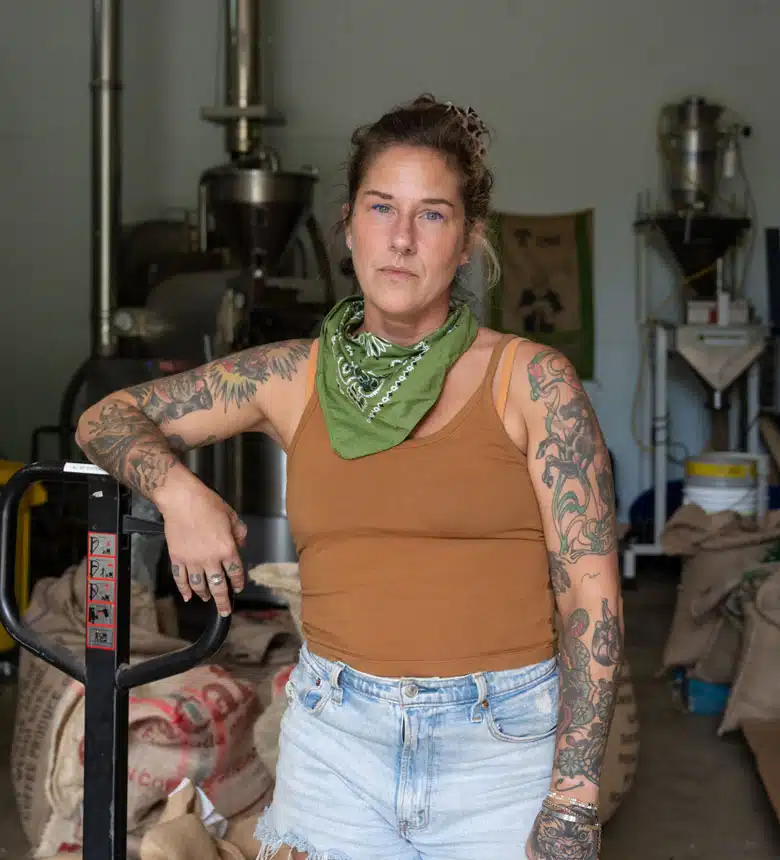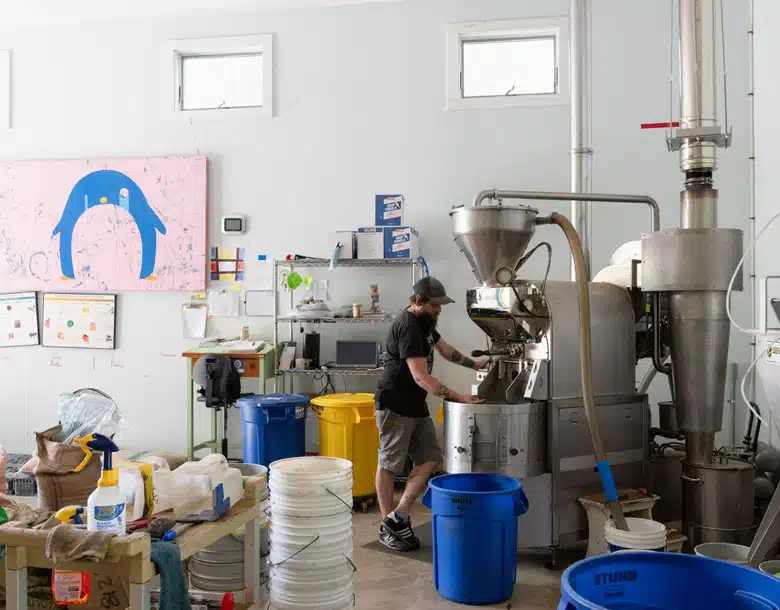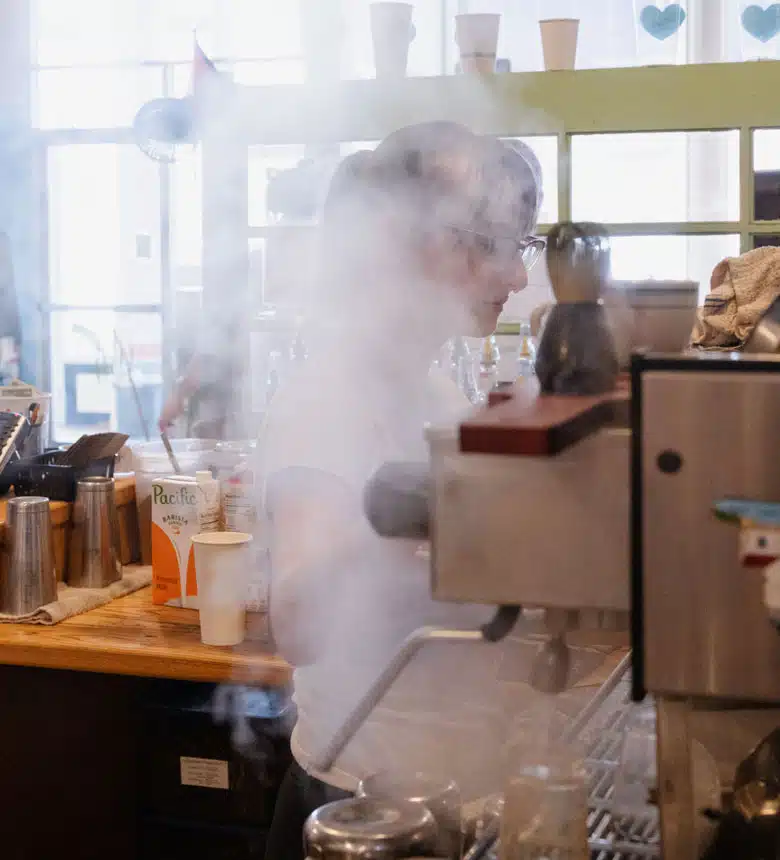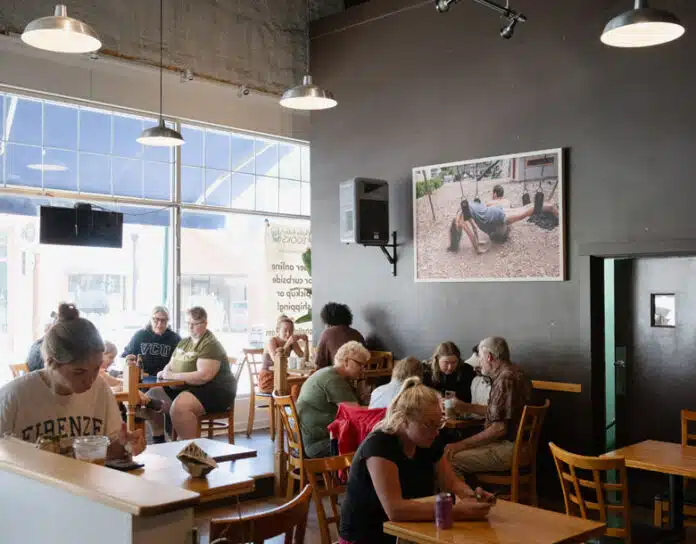Rock City Coffee had tried hard to keep prices stable amid President Donald Trump’s volatile tariff policy rollout.
The company, which has a roastery in Rockport, Maine, and a cafe in nearby Rockland, had pushed through a modest price increase on its beans earlier in the year because of relentless issues with the global coffee supply, caused in part by droughts in Vietnam and Brazil. But since the president imposed a blanket 10% tariff on U.S. trading partners in April, Rock City Coffee had been swallowing the additional cost on imported green coffee from countries around the world.
Then the situation became untenable. Its profits were rapidly eroding. On top of that, the president vowed in early July to impose a 50% tariff against Brazil that would elevate coffee prices even more if they went into effect.

So a few days later, Jessie Northgraves, Rock City Coffee’s CEO, posted a one-page letter on her company’s Facebook page.
“Our bean prices,” she wrote, “will be increasing within the next week.”
As Trump’s unpredictable trade war drags on and companies wrestle with whether, and when, to raise prices, Rock City Coffee is a case study in the decision-making process.
When Trump introduced his tariffs, many businesses were reluctant to pass on the costs to inflation-weary consumers. Many opted to shoulder the burden themselves even if it meant they would have to make do with smaller profit margins. Some have decided to delay pricing decisions while they wait to see if some of the most punishing tariffs will ever kick in.
But with no end to the tariffs in sight, more companies are starting to increase their prices to offset the higher costs of doing business despite concerns that they could drive customers away. Trump, who quickly suspended many of his highest tariffs for 90 days, has pushed out the deadline to Aug. 1 while continuing to lob fresh threats.
Large public corporations such as Walmart and toy makers Hasbro and Mattel have warned that the tariffs would push them to raise prices. Data from the Labor Department showed that prices were up significantly in June for some categories of items that are heavily exposed to tariffs, including toys and appliances. Economists expect price increases to spread as the steepest tariffs begin to kick in and bloated pretariff inventories dwindle.
For smaller independent businesses like Rock City Coffee, pricing decisions can be especially tricky. Unlike public companies, they are not expected to disclose the impact of tariffs to investors. Stiff competition with other businesses can keep them from raising prices out of fears that their customers will abandon them for cheaper alternatives.
“It is unpopular to take prices up in any scenario,” said Tim Calkins, a marketing professor at Northwestern University. “It’s particularly unpopular right now.”
Companies are especially wary of spooking customers so soon after a period of high inflation marked by sharp increases in the price of food, rent and other goods and services.
The more recent price adjustments also come with other considerations. Should a business tie higher prices directly to the president’s tariff policy given that doing so could be viewed as taking a political stance? Should a company publicize its decision to lift prices at all?
“People can read into moves lots of things,” Calkins said. “And that also makes them nervous about calling attention to their pricing moves.”
Trump has publicly criticized large corporations that say they are raising their prices as a result of tariffs, including Walmart and Mattel. He has insisted that tariffs will not raise prices for Americans because foreign countries will absorb the cost. The White House Council of Economic Advisers has instead released a report that it says shows prices for imported goods have fallen.
Rock City Coffee’s actions offer a different perspective.

At first, Rock City Coffee — which imported 50,000 pounds of beans last year from Ethiopia, Brazil, Indonesia and other countries — viewed the tariffs as a “looming cloud,” Northgraves said in an interview. The company typically locks in prices for beans months before they leave their country of origin, and the possible impact of the tariffs seemed far off.
Her more urgent concern was the upward global pressure on the cost of coffee beans that had finally compelled her to bump up prices April 1, before Trump announced his initial tariff rates.
When Rock City Coffee’s supplier, Royal New York, said in late April that it would be passing on the additional cost of tariffs to its customers — including on beans that customers had reserved at pretariff prices — Northgraves resolved not to increase her own prices accordingly.
“I thought maybe it would be temporary,” she said. “We were kind of trying to ride it out the past few months, not change our prices and just kind of absorb it as much as we could.”
Weighing on her thinking were her customers. From its opening in 1992, Rock City Coffee, now run as an employee cooperative, has had loyal followers. Northgraves knew many were nervous about how tariffs would affect their expenses, and she always worried that raising prices would stress them out — or scare them away entirely.
But even as she tried to brush off the tariff policy as a passing challenge, her profit margins were slipping. The cost of green beans has doubled and still seems to be rising. The price of the company’s packaging, which it buys from an American company that manufactures in China, was also set to swell.
Trump’s pledge to exact a 50% tariff on Brazilian imports — for which he cited a “witch hunt” against former Brazilian President Jair Bolsonaro — was the breaking point. “That kind of confirmed for me that this is not de-escalating, but it’s actually escalating rapidly,” she said.

Although Rock City Coffee has been trying to stock up on coffee and supplies, there is only so much it can store at one time. Northgraves suddenly felt that waiting any longer to increase her prices would risk irreversibly damaging her business and its plans for the future, which included expanding its roastery.
“I was like, we have to do something about it now,” she said.
On the evening of July 13 — four days after Trump announced the new tariffs against Brazil — she published her letter on Rock City Coffee’s Facebook page.
“We have been seriously hit by the tariffs in coffee-exporting countries, and must raise the prices of our beans,” she wrote in an accompanying note. “Please know that we wouldn’t do this if it wasn’t totally necessary.”
Using a spreadsheet she had created years ago, she calculated revised prices for bags of coffee that would allow her to keep her margins at 5% for wholesale beans and 50% for retail. For the first time in years, she also raised the price of drinks at Rock City Coffee’s cafe in nearby Rockland.
As she prepared to put the new prices in place, she gave her cafe counter employees a script to use with customers that explicitly linked the higher prices to tariffs. In the end, she said, she didn’t want to be the kind of business that increased prices quietly and hoped no one would notice.
“It just felt better to be up-front about it,” she said.
Northgraves was aware that so overtly connecting her higher prices to Trump’s tariffs carried some political risk. When companies like Walmart had indicated they would be increasing prices because of tariffs, they had drawn Trump’s ire.
But Rock City Coffee is a small business in a relatively liberal part of the state, and Northgraves was willing to take her chances.
“It definitely wasn’t intentionally some political statement, but I guess somehow it kind of is,” she said.
“I’m probably being put on some list somewhere for it,” she added.
On July 21, Rock City Coffee unveiled its new prices. For all of Northgraves’ consternation surrounding the move, her customers appeared to be accepting the increases without incident.
It had “been surprisingly painless on our end so far,” she said in a text message that afternoon. “It’s been smooth sailing all day.”
c.2025 The New York Times Company. This article originally appeared in The New York Times.







